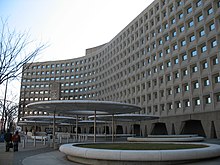U.S. Department of Housing and Urban Development

Seal of the U.S. Department of Housing and Urban Development
|
|

Flag of the United States Department of Housing and Urban Development
|
|
 Robert C. Weaver Federal Building, Department Headquarters |
|
| Agency overview | |
|---|---|
| Formed | September 9, 1965 |
| Preceding agency | |
| Jurisdiction | Federal government of the United States |
| Headquarters |
Robert C. Weaver Federal Building, 451 7th Street SW, Washington, D.C. 38°53′2.17″N 77°1′21.03″W / 38.8839361°N 77.0225083°WCoordinates: 38°53′2.17″N 77°1′21.03″W / 38.8839361°N 77.0225083°W |
| Employees | 8,416 (2014) |
| Annual budget | $32.6 Billion (2014) |
| Agency executives |
|
| Child agency |
|
| Website | hud.gov |
The United States Department of Housing and Urban Development (Commonly known as HUD) is a Cabinet department in the Executive branch of the United States federal government. Although its beginnings were in the House and Home Financing Agency, it was founded as a Cabinet department in 1965, as part of the "Great Society" program of President Lyndon Johnson, to develop and execute policies on housing and metropolises.
The department was established on September 9, 1965, when Lyndon B. Johnson signed the Department of Housing and Urban Development Act into law. It stipulated that the department was to be created no later than November 8, sixty days following the date of enactment. The actual implementation was postponed until January 13, 1966, following the completion of a special study group report on the federal role in solving urban problems.
HUD is administered by the United States Secretary of Housing and Urban Development. Craig Clemmensen is currently acting in the position until Ben Carson, his nominated successor in the Trump Administration, is confirmed. Its headquarters is located in the Robert C. Weaver Federal Building. Some important milestones for HUD's development include:
HUD’s mission is to create strong, sustainable, inclusive communities and quality affordable homes for all. HUD is working to strengthen the housing market to bolster the economy and protect consumers; meet the need for quality affordable rental homes; utilize housing as a platform for improving quality of life; build inclusive and sustainable communities free from discrimination; and transform the way HUD does business.
The major program offices are:
The United States Congress enacted the Inspector General Act of 1978 to ensure integrity and efficiency in government. The Inspector General is appointed by the President and subject to Senate confirmation. The Inspector General is responsible for conducting and supervising audits, investigations, and inspections relating to the programs and operations of HUD. The OIG is to examine, evaluate and, where necessary, critique these operations and activities, recommending ways for the Department to carry out its responsibilities in the most effective, efficient, and economical manner possible.
...
Wikipedia
